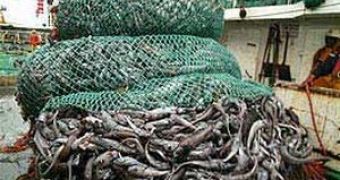Recent meta analyses showed that the world's marine production will fall by 2048, threatening human well-being. "Species have been disappearing from ocean ecosystems and this trend has recently been accelerating," said Boris Worm, an assistant professor of marine conservation biology at Dalhousie University, Halifax, Canada.
"Now we begin to see some of the consequences. If the long-term trend continues, all fish and seafood species are projected to collapse by 2048."
The team studied the role of marine biodiversity in maintaining ocean productivity. "At this point," Worm said, "29 % of fish and seafood species have collapsed -- that is their catch has declined by 90 %. It is a very clear trend, and it is accelerating. We don't have to use models to understand this trend; it is based on all the available data."
Bigger vessels, better nets, and new technology for spotting fish do not mean bigger production. In fact, the global catch fell by 13% between 1994 and 2003. "This applies to all species, from mussels and clams to tuna and swordfish," said Worm
Steve Palumbi, from Stanford University in California, added: "Unless we fundamentally change the way we manage all the ocean species together, as working ecosystems, then this century is the last century of wild seafood."
Ocean mammals, including seals and cetaceans, coastal birds and plants are also affected. "Whether we looked at tide pools or studies over the entire world's ocean, we saw the same picture emerging," Worm said.
"In losing species we lose the productivity and stability of entire ecosystems. I was shocked and disturbed by how consistent these trends are - beyond anything we suspected."
"When ocean species collapse, it makes the ocean itself weaker and less able to recover from shocks like global climate change, pollutions and over-explotation".
"The decline in marine biodiversity is largely due to over-fishing and destruction of habitat".
Low biodiversity means low productivity and stability. Biological filtering, nursery habitats and the protection of shorelines by marine species decline and/or vanish with the biodiversity.
Depleted biodiversity is also linked to disease outbreaks and related beach closure events, noxious algal blooms (red tide, for example), oxygen depletion, fish kills, vulnerability to invasive species, and coastal flooding. "In the ocean ecosystem, we're losing a lot of the species in our stock portfolio, and by that we're losing productivity and stability. By losing stability, we're losing the ability of the system to self-repair."
"This research shows we'll have few viable fisheries by 2050," Andrew Sugden, international managing editor of Science.
Four meta-analyses were made, progressing from local to regional and global scales. The first meta analysis focused on 32 marine experiments that monitored species diversity on small, local scales. Secondly, the team used scientific data and other sources (archives, fishery records) going back to the 1960s, but also historical records, sediments core and archaeological data 1,000-years old to see shifts in species diversity across 12 coastal regions around the world: Chesapeake, Delaware, Massachusetts, Galveston, San Francisco Bay and Pamlico Sound (all U.S.), The Bay of Fundy and Gulf of St. Lawrence (Canada), The Adriatic, Baltic and North Seas (Europe), as well as Moreton Bay (Australia).
After that, the team made a complex analysis of global fisheries catch data from 64 large marine ecosystems to see the effect of large scale fishing in losing species. Finally, the scientists investigated how 48 marine protected areas worldwide recovered biodiversity. "We see that diversity of species recovered dramatically, and with it the ecosystem's productivity and stability."
"To help depleted areas rebuild, marine-life reserves and no-fishing zones need to be set up," Worm said.
"This has proven effective in places including the Georges Bank off the US Atlantic coast. With marine reserves in place, fishing near the reserves can improve as much as four-fold"
Rebuilding marine biodiversity is also a benefit for the environment, not only for the fisheries. "The good news is that it is not too late to turn things around," Worm said.
"The researchers were surprised to find very similar relationships between biodiversity change and ecosystem services at scales ranging from small square-meter plots to entire ocean basins. This suggests that small-scale experiments can be used to predict large-scale ocean change."
Some types of aquaculture, like traditional Chinese cultivation of vegetarian carps using wastes can also be beneficial, but farms raising carnivorous fish are less effective. "Through this research, it became clear to me that we hardly appreciate living on a blue planet. The oceans define our planet, and their fate may to a large extent determine our fate, now and in the future." continues Worm.
"I'm just amazed, it's very irrational. You have scientific consensus and nothing moves. It's a sad example; and what happened in Canada should be such a warning, because now it's collapsed it's not coming back."

 14 DAY TRIAL //
14 DAY TRIAL //